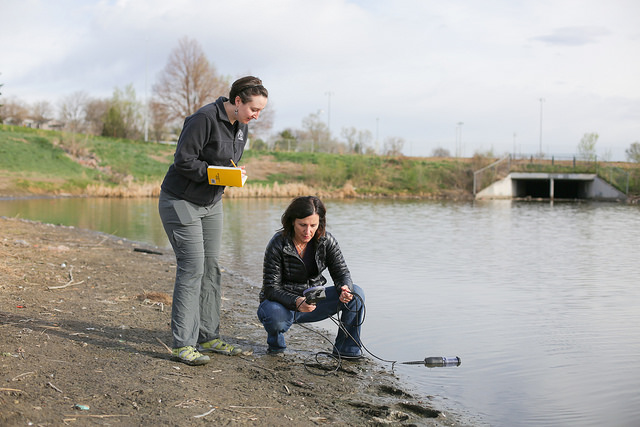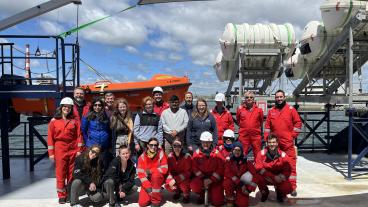 PhD student Chelsea Lynne Panos and Professor Terri Hogue take readings at a green infrastructure site near Denver, Colorado, in an effort to improve stormwater management. PhD student Chelsea Lynne Panos and Professor Terri Hogue take readings at a green infrastructure site near Denver, Colorado, in an effort to improve stormwater management. |
Total of $3.9 million awarded to two institutions
Denver, Colo., May 4, 2016 - The U.S. Environmental Protection Agency (EPA) has announced $3.9 million in funding to two institutions to research innovative, cost-effective technologies to manage stormwater runoff and combined sewer overflows.
Colorado School of Mines received $1.95M to develop a decision support tool to help communities evaluate alternative stormwater treatment technologies that consider diverse climates, regional practices and policies across the country. The tool will evaluate options and risks as well as life cycle costs associated with improving stormwater runoff management using green, gray and hybrid infrastructure. Colorado School of Mines will also create resources and hold workshops to conduct training sessions for these tools.
“EPA has done extensive research on green infrastructure to ensure the availability and quality of water in the United States,” said Thomas A. Burke, EPA Science Advisor and Deputy Assistant Administrator of EPA’s Office of Research and Development. “These grants will take this work a step further by developing green infrastructure technologies and providing an understanding of the full costs of using these new technologies over time.”
As water flows through storm drains, it carries many pollutants that end up in streams, rivers, ponds, lakes and oceans. Additionally, combined sewers carry sewage and stormwater runoff in the same pipe and when these exceed capacity, untreated water can be released into nearby waterways. Using the funding provided through these grants, researchers will produce tools and models to help communities evaluate the optimal mix of technologies that will treat stormwater with less energy, less expense and less burden on the environment. They will also research the possibility of reusing the cleaner water to help meet communities’ needs.
“Our decision support tool will help advance urban water management across the U.S. through integration of new green infrastructure technologies and by allowing decision makers to have access to state-of-the art tools, data sources and life cycle information,” said Professor Terri Hogue, lead investigator at Colorado School of Mines.
Due to aging water infrastructure systems and regulatory requirements, stormwater management is an expensive challenge for many communities. The awardees will focus on the most cost-effective options like green infrastructure, practices that enhance natural ecological functions, such as growing gardens on roofs or building artificial ponds, to help manage stormwater and combined sewer overflows. Green infrastructure can replenish groundwater, provide flood control, add green spaces and parks, and revitalize neighborhoods.
The Water Environment Research Foundation in Alexandria, Virginia also received $1.9 million to develop a life cycle cost and analysis framework, a publically accessible tool and database and a guide for decision makers that includes case studies.
To learn more about these awards recipients, visit www.epa.gov/research-grants/water-research-grants.
CONTACTS:
US EPA - Lisa McClain-Vanderpool, 303-312-6077
Cathy Milbourn, 202-564-7849
Mines - Karen Gilbert 303-273-3541



